Deck 15: Specimen Financial Statements: Pepsico, Inc
Question
Question
Question
Question
Question
Question
Question
Question
Question
Question
Question
Question
Question
Question
Question
Question
Question
Question
Question
Question
Question
Question
Question
Question
Question
Question
Question
Question
Question
Question
Question
Question
Question
Question
Question
Question
Question
Question
Question
Question
Question
Question
Question
Question
Question
Question
Question
Question
Question
Question
Question
Question
Question
Question
Question
Question
Question
Question
Question
Question
Question
Question
Question
Question
Question
Question
Question
Question
Question
Question
Question
Question
Question
Question
Question
Question
Question
Question
Question
Question

Unlock Deck
Sign up to unlock the cards in this deck!
Unlock Deck
Unlock Deck
1/211
Play
Full screen (f)
Deck 15: Specimen Financial Statements: Pepsico, Inc
1
Using the cost method of accounting for a stock investment, the journal entry to record the receipt of dividends involves a credit to Dividend Revenue.
True
2
Unless there is evidence to the contrary, an investor owning 25% of the stock of an investee is assumed to have significant influence.
True
3
In accordance with the historical cost principle, the cost of debt investments includes brokerage fees and accrued interest.
False
4
When investing excess cash for short periods of time, corporations invest in debt securities and stock securities.

Unlock Deck
Unlock for access to all 211 flashcards in this deck.
Unlock Deck
k this deck
5
The Stock Investments account is debited at acquisition under both the equity method and cost method of accounting for investments in common stock.

Unlock Deck
Unlock for access to all 211 flashcards in this deck.
Unlock Deck
k this deck
6
The accounting for short-term debt investments and for long-term debt investments is similar.

Unlock Deck
Unlock for access to all 211 flashcards in this deck.
Unlock Deck
k this deck
7
Under the equity method the investor records a proportionate share of the investee's income in the year when it is earned.

Unlock Deck
Unlock for access to all 211 flashcards in this deck.
Unlock Deck
k this deck
8
When the cost method is used to account for an investment in stock, dividends received are accounted for as a reduction in the investment account.

Unlock Deck
Unlock for access to all 211 flashcards in this deck.
Unlock Deck
k this deck
9
Debt investments are investments in government and corporation bonds.

Unlock Deck
Unlock for access to all 211 flashcards in this deck.
Unlock Deck
k this deck
10
A reason some companies purchase investments is because they generate a significant portion of their earnings from investment income.

Unlock Deck
Unlock for access to all 211 flashcards in this deck.
Unlock Deck
k this deck
11
Under the equity method, the investment in common stock is initially recorded at cost, and the Stock Investments account is adjusted annually.

Unlock Deck
Unlock for access to all 211 flashcards in this deck.
Unlock Deck
k this deck
12
When investments in bonds are sold, any difference between the sales price and the fair value of the bonds is recorded as a gain or loss.

Unlock Deck
Unlock for access to all 211 flashcards in this deck.
Unlock Deck
k this deck
13
Some companies purchase investments for strategic reasons believing the investment will increase in value and result in positive returns.

Unlock Deck
Unlock for access to all 211 flashcards in this deck.
Unlock Deck
k this deck
14
Dividends received on investments are accounted for in the same way under the cost and the equity method.

Unlock Deck
Unlock for access to all 211 flashcards in this deck.
Unlock Deck
k this deck
15
Some companies attempt to generate investment income through speculative investments.

Unlock Deck
Unlock for access to all 211 flashcards in this deck.
Unlock Deck
k this deck
16
If the cost method is used to account for an investment in stock, the Stock Investments account is increased by the amount of dividends received during the period.

Unlock Deck
Unlock for access to all 211 flashcards in this deck.
Unlock Deck
k this deck
17
If an investor owns between 20% and 50% of an investee's common stock, it is presumed that the investor has significant influence on the investee.

Unlock Deck
Unlock for access to all 211 flashcards in this deck.
Unlock Deck
k this deck
18
In accordance with the historical cost principle, brokerage fees should be added to the cost of an investment.

Unlock Deck
Unlock for access to all 211 flashcards in this deck.
Unlock Deck
k this deck
19
Dividends received on stock investments of less than 20% should be credited to the Stock Investments account.

Unlock Deck
Unlock for access to all 211 flashcards in this deck.
Unlock Deck
k this deck
20
Corporations purchase investments in debt or equity securities generally for one of two reasons.

Unlock Deck
Unlock for access to all 211 flashcards in this deck.
Unlock Deck
k this deck
21
In accounting for stock investments of less than 20%, the equity method is typically used.

Unlock Deck
Unlock for access to all 211 flashcards in this deck.
Unlock Deck
k this deck
22
A decline in the fair value of a trading security is recorded by debiting an unrealized loss account and crediting the Fair Value Adjustment account.

Unlock Deck
Unlock for access to all 211 flashcards in this deck.
Unlock Deck
k this deck
23
Unrealized gains and losses on available-for-sale debt securities are reported on the income statement.

Unlock Deck
Unlock for access to all 211 flashcards in this deck.
Unlock Deck
k this deck
24
Consolidated financial statements are appropriate when an investor controls an investee by ownership of more than 50% of the investee's common stock.

Unlock Deck
Unlock for access to all 211 flashcards in this deck.
Unlock Deck
k this deck
25
Consolidated financial statements should be prepared only when a subsidiary company has a controlling interest in the parent company.

Unlock Deck
Unlock for access to all 211 flashcards in this deck.
Unlock Deck
k this deck
26
The valuation of available-for-sale debt securities is similar to the procedures followed for trading debt securities, except that changes in fair value are not recognized in current income.

Unlock Deck
Unlock for access to all 211 flashcards in this deck.
Unlock Deck
k this deck
27
Trading securities are valued on the balance sheet at their fair value.

Unlock Deck
Unlock for access to all 211 flashcards in this deck.
Unlock Deck
k this deck
28
For available-for-sale securities, the unrealized gain or loss account is carried forward to future periods.

Unlock Deck
Unlock for access to all 211 flashcards in this deck.
Unlock Deck
k this deck
29
An investment in short-term equity securities should be charged to a nominal account since the investment is temporary.

Unlock Deck
Unlock for access to all 211 flashcards in this deck.
Unlock Deck
k this deck
30
Consolidated financial statements are prepared in place of the financial statements for the parent and subsidiary companies.

Unlock Deck
Unlock for access to all 211 flashcards in this deck.
Unlock Deck
k this deck
31
The Fair Value Adjustment account can only have a credit balance or a zero balance.

Unlock Deck
Unlock for access to all 211 flashcards in this deck.
Unlock Deck
k this deck
32
Under the equity method, the receipt of dividends from the investee company results in a credit to the Dividend Revenue account.

Unlock Deck
Unlock for access to all 211 flashcards in this deck.
Unlock Deck
k this deck
33
To be classified as a short-term investment, the investment must be readily marketable and intended to be converted into cash within the next year or operating cycle.

Unlock Deck
Unlock for access to all 211 flashcards in this deck.
Unlock Deck
k this deck
34
An investment is readily marketable if it is management's intent to sell the investment.

Unlock Deck
Unlock for access to all 211 flashcards in this deck.
Unlock Deck
k this deck
35
Unrealized gains and losses are recognized on trading debt securities.

Unlock Deck
Unlock for access to all 211 flashcards in this deck.
Unlock Deck
k this deck
36
An unrealized gain or loss on trading securities is reported as a separate component of stockholders' equity.

Unlock Deck
Unlock for access to all 211 flashcards in this deck.
Unlock Deck
k this deck
37
Under the equity method, the receipt of dividends from the investee company results in an increase in the Stock Investments account.

Unlock Deck
Unlock for access to all 211 flashcards in this deck.
Unlock Deck
k this deck
38
If the fair value of an available-for-sale security exceeds its cost, the security should be written up to fair value and a realized gain should be recognized.

Unlock Deck
Unlock for access to all 211 flashcards in this deck.
Unlock Deck
k this deck
39
The account Fair Value Adjustment-Trading appears as a contra account in the income statement.

Unlock Deck
Unlock for access to all 211 flashcards in this deck.
Unlock Deck
k this deck
40
Stocks traded on the New York Stock Exchange are considered readily marketable.

Unlock Deck
Unlock for access to all 211 flashcards in this deck.
Unlock Deck
k this deck
41
On January 1, 2017, Tri-State Supply Company purchased at face value, a $1,000, 5%, bond that pays interest annually on January 1. Tri-State Company has a calendar year end. The entry on January 1, 2017, is 


Unlock Deck
Unlock for access to all 211 flashcards in this deck.
Unlock Deck
k this deck
42
Mazzeo Company acquires 80 Dodd's 10%, 5 year, $1,000 bonds on January 1, 2017 for $80,000. The journal entry to record this investment includes a debit to
A) Debt Investments for $88,000.
B) Debt Investments for $80,000.
C) Cash for $80,000.
D) Stock Investments for $80,000.
A) Debt Investments for $88,000.
B) Debt Investments for $80,000.
C) Cash for $80,000.
D) Stock Investments for $80,000.

Unlock Deck
Unlock for access to all 211 flashcards in this deck.
Unlock Deck
k this deck
43
On January 1, 2017, Tri-State Supply Company purchased at face value, a $1,000, 5%, bond that pays interest annually on January 1. Tri-State Company has a calendar year end. The adjusting entry on December 31, 2017, is 


Unlock Deck
Unlock for access to all 211 flashcards in this deck.
Unlock Deck
k this deck
44
At the time of acquisition of a debt investment
A) no journal entry is required.
B) the historical cost principle applies.
C) the Stock Investments account is debited when bonds are purchased.
D) the investment account is credited for its cost plus brokerage fees.
A) no journal entry is required.
B) the historical cost principle applies.
C) the Stock Investments account is debited when bonds are purchased.
D) the investment account is credited for its cost plus brokerage fees.

Unlock Deck
Unlock for access to all 211 flashcards in this deck.
Unlock Deck
k this deck
45
Mazzeo Company acquires 80 Dodd's 10%, 5 year, $1,000 bonds on January 1, 2017 for $80,000. Assume Dodd's pays interest annually on January 1. Mazzeo's journal entry at December 31, 2017 would include a credit to
A) Interest Receivable for $4,000.
B) Interest Receivable for $8,000.
C) Interest Expense for $8,000.
D) Interest Revenue for $8,000.
A) Interest Receivable for $4,000.
B) Interest Receivable for $8,000.
C) Interest Expense for $8,000.
D) Interest Revenue for $8,000.

Unlock Deck
Unlock for access to all 211 flashcards in this deck.
Unlock Deck
k this deck
46
Which is not a strategic reason to invest?
A) There has been a change in the economic climate.
B) To establish a presence in a related industry.
C) To exercise some influence over a customer or supplier.
D) To enter a new industry without starting from scratch.
A) There has been a change in the economic climate.
B) To establish a presence in a related industry.
C) To exercise some influence over a customer or supplier.
D) To enter a new industry without starting from scratch.

Unlock Deck
Unlock for access to all 211 flashcards in this deck.
Unlock Deck
k this deck
47
On January 1, 2017, the LaRoche Company purchased at face value, a $1,000, 4%, bond that pays interest on January 1. LaRoche Company has a calendar year end. The entry for the receipt of interest on January 1, 2018, is 


Unlock Deck
Unlock for access to all 211 flashcards in this deck.
Unlock Deck
k this deck
48
Mazzeo Company acquires 80 Dodd's 10%, 5 year, $1,000 bonds on January 1, 2017 for $80,000. If Mazzeo sells all of its Dodd's Bonds for $78,900 what gain or loss is recognized?
A) Loss of $9,100
B) Loss of $1,100
C) Gain of $1,100
D) Gain of $9,100
A) Loss of $9,100
B) Loss of $1,100
C) Gain of $1,100
D) Gain of $9,100

Unlock Deck
Unlock for access to all 211 flashcards in this deck.
Unlock Deck
k this deck
49
On January 1, 2017, JBT Company purchased at face value, a $1,000 6%, bond that pays interest on January 1. JBT Company has a calendar year end. The entry for the receipt of interest on January 1, 2018 is 


Unlock Deck
Unlock for access to all 211 flashcards in this deck.
Unlock Deck
k this deck
50
When investing excess cash for short periods of time, corporations invest in
A) stocks of companies in a related industry.
B) debt securities.
C) low-risk, highly liquid securities.
D) stock securities.
A) stocks of companies in a related industry.
B) debt securities.
C) low-risk, highly liquid securities.
D) stock securities.

Unlock Deck
Unlock for access to all 211 flashcards in this deck.
Unlock Deck
k this deck
51
Banks and financial institutions often purchase debt securities to
A) house excess cash until needed.
B) generate earnings.
C) meet strategic goals.
D) improve their public image.
A) house excess cash until needed.
B) generate earnings.
C) meet strategic goals.
D) improve their public image.

Unlock Deck
Unlock for access to all 211 flashcards in this deck.
Unlock Deck
k this deck
52
On January 1, 2017, the LaRoche Company purchased at face value, a $1,000, 4%, bond that pays interest on January 1. LaRoche Company has a calendar year end. The adjusting entry on December 31, 2017, is 


Unlock Deck
Unlock for access to all 211 flashcards in this deck.
Unlock Deck
k this deck
53
In accounting for debit investments, companies make entries for each of the following except:
A) acquisition
B) interest revenue
C) sale
D) its share of the investee's net income
A) acquisition
B) interest revenue
C) sale
D) its share of the investee's net income

Unlock Deck
Unlock for access to all 211 flashcards in this deck.
Unlock Deck
k this deck
54
On January 1, 2017, the LaRoche Company purchased at face value, a $1,000, 5%, bond that pays interest on January 1. LaRoche Company has a calendar year end. The entry for the receipt of interest on January 1, 2018 is 


Unlock Deck
Unlock for access to all 211 flashcards in this deck.
Unlock Deck
k this deck
55
If a company buys the stocks of companies in a related industry, they are most likely investing because they
A) have excess cash.
B) are trying to meet a strategic goal.
C) are trying to generate earnings.
D) have speculative reasons.
A) have excess cash.
B) are trying to meet a strategic goal.
C) are trying to generate earnings.
D) have speculative reasons.

Unlock Deck
Unlock for access to all 211 flashcards in this deck.
Unlock Deck
k this deck
56
Why do corporations generally invest in debt or equity securities?
A) They have excess cash.
B) They want to generate earnings from investment income.
C) They invest for strategic reasons.
D) All of these answer choices are correct.
A) They have excess cash.
B) They want to generate earnings from investment income.
C) They invest for strategic reasons.
D) All of these answer choices are correct.

Unlock Deck
Unlock for access to all 211 flashcards in this deck.
Unlock Deck
k this deck
57
On January 1, 2017, JBT Company purchased at face value, a $1,000 6%, bond that pays interest on January 1. JBT Company has a calendar year end. The adjusting entry on December 31, 2017, is 


Unlock Deck
Unlock for access to all 211 flashcards in this deck.
Unlock Deck
k this deck
58
Corporations invest in other companies for all of the following reasons except to
A) house excess cash until needed.
B) generate earnings.
C) meet strategic goals.
D) increase trading of the other companies' stock.
A) house excess cash until needed.
B) generate earnings.
C) meet strategic goals.
D) increase trading of the other companies' stock.

Unlock Deck
Unlock for access to all 211 flashcards in this deck.
Unlock Deck
k this deck
59
On January 1, 2017, JBT Company purchased at face value, a $1,000 6%, bond that pays interest on January 1. JBT Company has a calendar year end. The entry on January 1, 2017, is 


Unlock Deck
Unlock for access to all 211 flashcards in this deck.
Unlock Deck
k this deck
60
Which of the following is a debt security?
A) IBM stock.
B) Treasury stock.
C) Treasury bills.
D) None of these answer choices are correct.
A) IBM stock.
B) Treasury stock.
C) Treasury bills.
D) None of these answer choices are correct.

Unlock Deck
Unlock for access to all 211 flashcards in this deck.
Unlock Deck
k this deck
61
Vangaurd Co. purchased 80, 5% McLaughlin Company bonds for $80,000 cash. Interest is payable annually on January 1. The entry to record the purchase would include debit to
A) Debt Investments for $82,000.
B) Cash for $84,000.
C) Debt Investments for $80,000.
D) Stock Investments for $80,000.
A) Debt Investments for $82,000.
B) Cash for $84,000.
C) Debt Investments for $80,000.
D) Stock Investments for $80,000.

Unlock Deck
Unlock for access to all 211 flashcards in this deck.
Unlock Deck
k this deck
62
On January 1, 2017, Tri-State Company purchased at face value, a $1,000, 5%, bond that pays interest annually on January 1. Tri-State Company has a calendar year end. The entry for the receipt of interest on January 1, 2018 is 


Unlock Deck
Unlock for access to all 211 flashcards in this deck.
Unlock Deck
k this deck
63
Buford Industries owns 40% of Appalachian Company. For the current year, Appalachian reports net income of $250,000 and declares and pays a $70,000 cash dividend. Which of the following correctly presents the journal entries to record Buford's equity in Appalachian net income and the receipt of dividends from Appalachian? 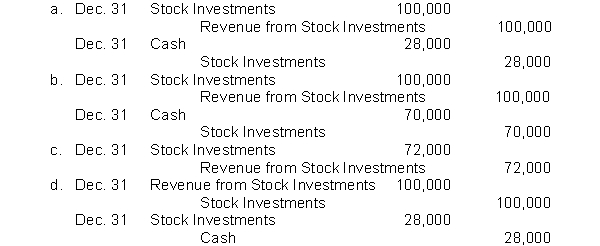


Unlock Deck
Unlock for access to all 211 flashcards in this deck.
Unlock Deck
k this deck
64
Cedar Co. purchased 80, 6% LKN Company bonds for $80,000 cash. Interest is payable annually on January 1. If 40 of the securities are sold January 1 for $41,000 the entry would include a credit to Gain on Sale of Debt Investments of
A) $500.
B) $1,200.
C) $5,400.
D) $1,000.
A) $500.
B) $1,200.
C) $5,400.
D) $1,000.

Unlock Deck
Unlock for access to all 211 flashcards in this deck.
Unlock Deck
k this deck
65
On January 1, Belvedere Company purchased as an investment a $1,000, 7% bond for $1,000. The bond pays interest on January 1. What is the entry to record the interest accrual on December 31? 


Unlock Deck
Unlock for access to all 211 flashcards in this deck.
Unlock Deck
k this deck
66
McComb Inc. earns $1,350,000 and pays cash dividends for $450,000 during 2017. SFX Corporation owns 70,000 of the 210,000 outstanding shares of McComb. How much revenue from investment should SFX report in 2017?
A) $150,000
B) $300,000
C) $450,000
D) $600,000
A) $150,000
B) $300,000
C) $450,000
D) $600,000

Unlock Deck
Unlock for access to all 211 flashcards in this deck.
Unlock Deck
k this deck
67
Charleston Co. purchased 60, 6% APS Company bonds on January 1, 2017 for $60,000 cash. Interest is payable annually on January 1. The entry to record the January 1, 2018 annual interest payment would include a
A) debit to Interest Receivable for $3,600.
B) credit to Interest Receivable for $3,600.
C) credit to Interest Revenue for $3,600.
D) credit to Debt Investments for $3,600.
A) debit to Interest Receivable for $3,600.
B) credit to Interest Receivable for $3,600.
C) credit to Interest Revenue for $3,600.
D) credit to Debt Investments for $3,600.

Unlock Deck
Unlock for access to all 211 flashcards in this deck.
Unlock Deck
k this deck
68
On January 1, Connid Company purchased as an investment a $1,000, 8% bond for $1,000. The bond pays interest on January 1. What is the entry to record the interest accrual on December 31? 


Unlock Deck
Unlock for access to all 211 flashcards in this deck.
Unlock Deck
k this deck
69
McComb Inc. earns $1,350,000 and pays cash dividends for $450,000 during 2017. SFX Corporation owns 70,000 of the 210,000 outstanding shares of McComb. What amount should SFX show in the investment account at December 31, 2017 if the beginning of the year balance in the account was $150,000?
A) $450,000
B) $300,000
C) $420,000
D) $600,000
A) $450,000
B) $300,000
C) $420,000
D) $600,000

Unlock Deck
Unlock for access to all 211 flashcards in this deck.
Unlock Deck
k this deck
70
On January 1, U.K. Enterprise purchased as an investment a $1,000, 7% bond for $1,000. The bond pays interest on January 1. The bond is sold on July 1 for $1,120 plus accrued interest. Interest has not been accrued since the last interest payment date. What is the entry to record the cash proceeds at the time the bond is sold? 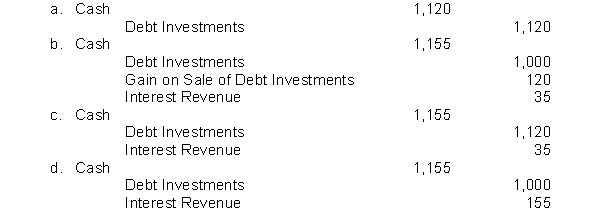


Unlock Deck
Unlock for access to all 211 flashcards in this deck.
Unlock Deck
k this deck
71
Charleston Co. purchased 60, 6% APS Company bonds on January 1, 2017 for $60,000 cash. Interest is payable annually on January 1. The entry to record the December 31 interest accrual would include a
A) debit to Interest Receivable for $3,600.
B) debit to Interest Revenue for $3,600.
C) credit to Cash Revenue for $3,600.
D) debit to Debt Investments for $3,600.
A) debit to Interest Receivable for $3,600.
B) debit to Interest Revenue for $3,600.
C) credit to Cash Revenue for $3,600.
D) debit to Debt Investments for $3,600.

Unlock Deck
Unlock for access to all 211 flashcards in this deck.
Unlock Deck
k this deck
72
Which of the following is a true statement about the accounting for long-term debt investments?
A) The investment is initially recorded at cost.
B) The cost includes any brokerage fees.
C) Debt investments include investment in government and corporation bonds.
D) All of these choices are correct.
A) The investment is initially recorded at cost.
B) The cost includes any brokerage fees.
C) Debt investments include investment in government and corporation bonds.
D) All of these choices are correct.

Unlock Deck
Unlock for access to all 211 flashcards in this deck.
Unlock Deck
k this deck
73
On January 1, Vega Company purchased as an investment a $1,000, 6% bond for $1,000. The bond pays interest on January 1. The bond is sold on July 1 for $1,100 plus accrued interest. Interest has not been accrued since the last interest payment date. What is the entry to record the cash proceeds at the time the bond is sold? 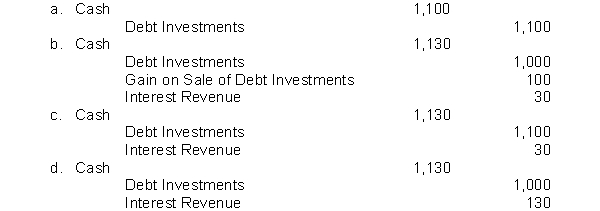


Unlock Deck
Unlock for access to all 211 flashcards in this deck.
Unlock Deck
k this deck
74
Porter Brothers Company purchased a debt investment for $80,000 on January 1, 2017. On January 1, 2018, Porter received cash interest of $4,000. Which of the following correctly presents the journal entries for the purchase and the receipt of interest? 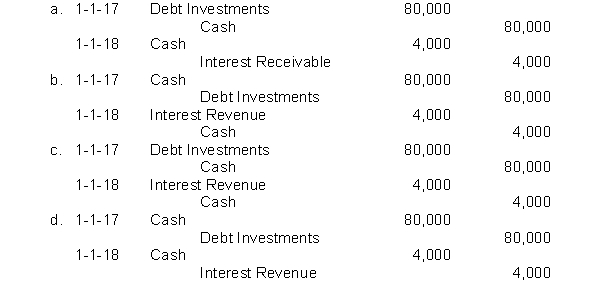


Unlock Deck
Unlock for access to all 211 flashcards in this deck.
Unlock Deck
k this deck
75
On January 1, Waverly Company purchased as an investment a $1,000, 7% bond for $1,000. The bond pays interest on January 1. What is the entry to record the interest accrual on December 31? 


Unlock Deck
Unlock for access to all 211 flashcards in this deck.
Unlock Deck
k this deck
76
On January 1, Bay View Company purchased as an investment a $1,000, 5% bond for $1,000. The bond pays interest on January 1. The bond is sold on July 1 for $1,070 plus accrued interest. Interest has not been accrued since the last interest payment date. What is the entry to record the cash proceeds at the time the bond is sold? 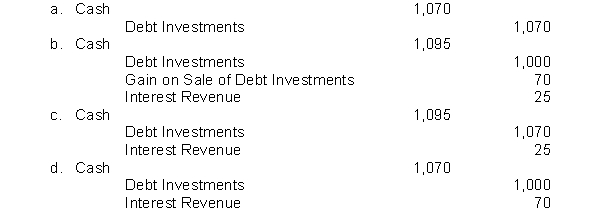


Unlock Deck
Unlock for access to all 211 flashcards in this deck.
Unlock Deck
k this deck
77
If a debt investment is sold, the investment account is
A) debited for the book value of the bonds at the sale date.
B) credited for the cost of the bonds at the sale date.
C) credited for the fair value of the bonds at the sale date.
D) debited for the cost of the bonds at the sale date.
A) debited for the book value of the bonds at the sale date.
B) credited for the cost of the bonds at the sale date.
C) credited for the fair value of the bonds at the sale date.
D) debited for the cost of the bonds at the sale date.

Unlock Deck
Unlock for access to all 211 flashcards in this deck.
Unlock Deck
k this deck
78
All of the following factors would be signs of an investor's significant influence over an investee except
A) the investor has representation on the investee's board of directors.
B) the investor participates in the investee's policy-making process.
C) there are immaterial transactions between the investor and the investee.
D) the common stock held by other stockholders is dispersed.
A) the investor has representation on the investee's board of directors.
B) the investor participates in the investee's policy-making process.
C) there are immaterial transactions between the investor and the investee.
D) the common stock held by other stockholders is dispersed.

Unlock Deck
Unlock for access to all 211 flashcards in this deck.
Unlock Deck
k this deck
79
On August 1, Basil Company buys 2,000 shares of Zingo common stock for $61,500 cash. On December 1, the stock investments are sold for $71,000 in cash. Which of the following are the correct journal entries of record for the purchase and sale of the common stock? 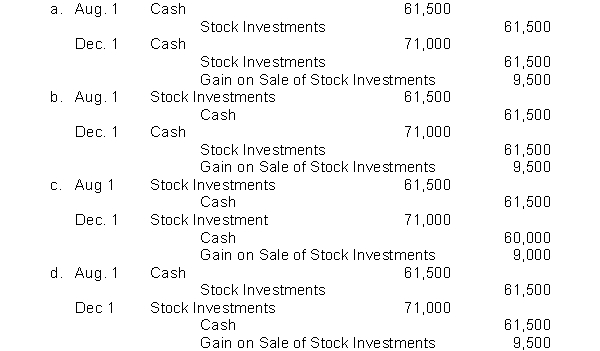


Unlock Deck
Unlock for access to all 211 flashcards in this deck.
Unlock Deck
k this deck
80
On January 1, 2017, Chic Corp. paid $750,000 for 100,000 shares of Toto Company's common stock, which represents 25% of Toto's outstanding common stock. Toto reported income of $300,000 and paid cash dividends of $80,000 during 2017 Chic should report the investment in Toto Company on its December 31, 2017, balance sheet at
A) $750,000
B) $825,000
C) $770,000
D) $805,000
A) $750,000
B) $825,000
C) $770,000
D) $805,000

Unlock Deck
Unlock for access to all 211 flashcards in this deck.
Unlock Deck
k this deck


